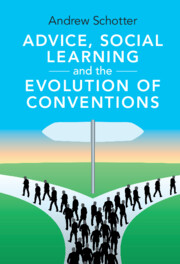Book contents
- Frontmatter
- Dedication
- Brief Contents
- Contents
- Figures
- Tables
- Preface
- 1 Introduction
- Part I Background
- Part II Coordination, Distribution, and Trust Conventions
- 4 On the Evolution of Coordination and Inequality-Preserving Conventions – the Battle of the Sexes Revisited
- 5 Conventional Behavior and Bargaining – Advice and Behavior in Intergenerational Ultimatum Games
- 6 Trust and Trustworthiness
- Part III The Impact of Public Advice and Common Knowledge
- Part IV The Value of Advice
- Part V Advice and Economic Mechanisms
- Index
6 - Trust and Trustworthiness
from Part II - Coordination, Distribution, and Trust Conventions
Published online by Cambridge University Press: 09 March 2023
- Frontmatter
- Dedication
- Brief Contents
- Contents
- Figures
- Tables
- Preface
- 1 Introduction
- Part I Background
- Part II Coordination, Distribution, and Trust Conventions
- 4 On the Evolution of Coordination and Inequality-Preserving Conventions – the Battle of the Sexes Revisited
- 5 Conventional Behavior and Bargaining – Advice and Behavior in Intergenerational Ultimatum Games
- 6 Trust and Trustworthiness
- Part III The Impact of Public Advice and Common Knowledge
- Part IV The Value of Advice
- Part V Advice and Economic Mechanisms
- Index
Summary
The willingness to trust others does not just happen. We are taught to trust by those who have lived before us and by observing whether it is safe to do so. We are also schooled in the benefits of trustworthiness. The level of trust existing in a society influences the way life is organized. These concerns raise certain questions that we hope to answer in this chapter. For example, how do we learn to trust each other? Once a convention of trust is created, how is it passed on from generation to generation? Does intergenerational communication increase or decrease trust? Does it increase or decrease trustworthiness? Is trust profitable? What is the causal relationship between trust and trustworthiness? In this chapter we use an intergenerational version of the well-known trust game (Berg, Dickhaut, and McCabe, 1995) to help us answer these questions about how trust is developed and communicated to others. We find that advice seems to decrease the amount of trust that evolves when this game is played in an intergenerational manner in that it decreases the amount of money sent from senders to receivers. Ironically, advice increases trustworthiness in that receivers tend to send more back. However, in no case, on average, does it pay to send any money. We explain this contradiction by examining the asymmetrical impact that advice has when serving as an anchor from which sending and returning behavior is adjusted. Further, we have discovered that subjects appear to follow conventions of reciprocity in that they tend to send more if they think the receivers acted in a “kind” manner, where “kind” means the sender sent more money than the receiver expected. Finally, while we find a causal relationship between trustworthiness and trust, the opposite cannot be established. We note that many of our results can only be achieved using the tools offered by intergenerational games. The intergenerational advice offered provides information not available when games are played in their static form. Combining that information with elicited beliefs of the senders and receivers adds even more information that can be used to investigate the motives that subjects have for doing what they do.
Keywords
- Type
- Chapter
- Information
- Advice, Social Learning and the Evolution of Conventions , pp. 138 - 168Publisher: Cambridge University PressPrint publication year: 2023

